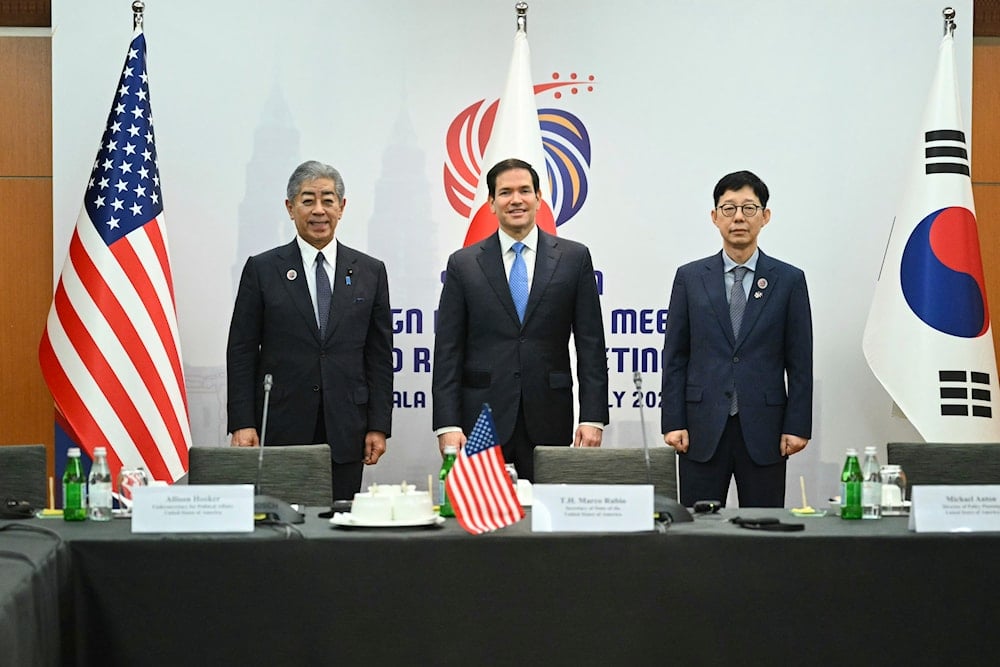Japan learns the hard way; US alliance is conditional: WaPo
US President Donald Trump’s tariff threat against Japan exposes the fragility of US alliances under his leadership, where loyalty is sidelined by transactional, strong-arm tactics.
-

From left, Japan's Foreign Minister Takeshi Iwaya, U.S. Secretary of State Marco Rubio and South Korea's Vice Foreign Minister Park Yoonjoo pose for a photo at the start of their meeting on the sidelines of the Association of Southeast Asian Nations (ASEAN) Foreign Ministers' Meeting at the Kuala Lumpur Convention Centre in Kuala Lumpur on July 11, 2025. (Mandel Ngan/Pool Photo via AP)
Just five months after US President Donald Trump hailed the "fantastic relationship" between Washington and Tokyo during a high-profile meeting with Prime Minister Shigeru Ishiba, Japan is now facing the sharp edge of Trump’s trade-first agenda. This week, Ishiba received a formal warning from the White House threatening punitive tariffs unless Japan meets a newly imposed trade deadline, a dramatic shift that left Japanese officials reeling.
As The Washington Post (WP) reported on Saturday, the move underscores a key principle of Trump’s foreign policy: even long-standing allies are not immune from economic pressure. For Tokyo, a critical US partner in regional security, the message is clear: personal diplomacy and past praise offer little protection when trade imbalances are at stake.
"Japan is learning a tough lesson; they’re not as special to Trump as they thought," said Mireya Solís of the Brookings Institution, adding, "When Trump sees trade deficits, he’s not thinking, ‘This is my close security partner.’ He sees deficits."
Early optimism fades into stalemate
According to WP, trade negotiations began in April on a seemingly optimistic note. Trump even gifted Japan’s trade envoy Ryosei Akazawa a red "Make America Great Again" hat, which Akazawa wore during a photo op in the Oval Office. "A Great Honor to have just met with the Japanese Delegation on Trade. Big Progress!" Trump later posted.
But behind the photo ops, talks stalled quickly. Domestic political constraints limited Ishiba’s ability to offer concessions in critical sectors such as autos, steel, and agriculture. With parliamentary elections looming on July 20, Ishiba faces a politically precarious environment that could cost his party its majority, and potentially his position as prime minister, as per the piece.
Tokyo had hoped to secure a tariff-rate quota arrangement similar to what other allies received during Trump’s first term. But this time, the US president made it clear: Japan would receive no exceptions.
“Japan is being treated the same as other Asian nations, and that is not making policymakers here happy,” Tokuko Shironitta of the Asia Group told The Washington Post.
Japan's economic argument falls flat
Throughout the talks, Ishiba’s government emphasized Japan’s long-standing role as the largest foreign investor in the US, responsible for creating over one million American jobs since 2019. In the past, such statistics impressed Trump. This time, however, they carried little weight.
"It feels like we’re still in a dense fog," Akazawa told reporters after seven inconclusive rounds of negotiations in early June.
Hiroshi Oe, Japan’s former lead trade negotiator, described Trump’s demands as "even more hard-line" than expected, adding that "Unfortunately, they no longer seem to operate under the assumption that they should treat [Japan] with any special consideration."
Experts now suggest Tokyo may have overestimated the strength of its relationship with Washington. "It was a strategic mistake on the part of the Japanese government and the Ishiba administration," said Kenji Minemura of the Canon Institute for Global Studies, adding that "We’re now in a completely different phase from the first Trump administration. The US wants different things now."
Echoes of the past
Trump’s tough rhetoric has revived long-standing grievances dating back to the 1980s, when Japan’s economic rise was seen as a threat by many in the US, including Trump himself.
During his first term, Trump softened that stance thanks largely to a close personal relationship with then-Prime Minister Shinzo Abe. But Abe’s 2022 assassination left Japan without a key backchannel to the Trump White House.
"He’s from the Japan-bashing generation," said Minemura, adding, "That’s why Trump’s inherent suspicion of Japan has come back to the surface."
Former Japanese Ambassador to the US Ichiro Fujisaki warned that cracks in the alliance could embolden regional adversaries, as cited in the report.
"When our relations are sour, or seem to be sour from other countries’ [view], I think that would only encourage Russia, North Korea, and China," he said. Fujisaki also urged Japanese leaders to reach an agreement, even if it means accepting an imbalanced deal: "The most realistic outcome is one where the US win is a capital-letter ‘Win,’ and our win is a small-letter ‘win.’"
Key sticking points: Autos and rice
The report details that in 2024, Japan exported 1.4 million cars to the US, while importing just over 16,000 American vehicles. Japanese officials say US cars don’t meet domestic needs, citing narrow roads and compact parking. While Tokyo has offered to revisit safety standards, it refuses to accept a proposed 25% auto tariff.
Rice, meanwhile, is a politically and culturally sensitive issue. Japan’s domestically grown Japonica rice is prized for its sticky texture and flavor. Trump, however, has framed the rice trade as a symbol of protectionism: “Japan, our friend, charges us 700 percent [on rice], but that’s because they don’t want us selling rice and other [products].”
Japanese officials argue the claim is misleading, as per the piece. Under WTO rules, Japan already allows up to 770,000 tons of rice imports annually, much of it duty-free. The US is the largest rice exporter to Japan. A recent domestic shortage even forced Tokyo to increase rice imports.
Nonetheless, any significant rise in imports could spark backlash from Japan’s powerful farming lobby. Ishiba has called rice protection “a matter of national interest.”
Read next: China, South Korea, Japan to boost free trade amid US tariff threat

 6 Min Read
6 Min Read










